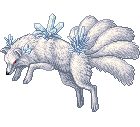Viewing CMdB7

Breed: Glacia Alsalto ❄ This is a seasonal species.
View checklist This creature has too many gene combinations to have a checklist.
Gender: Female
Father: Unknown
Unknown Pedigree
Hardiness: 45
Appearance: 23
Emerged: 21:57 28.12.2020
Matured: 2:34 31.12.2020
The warmth provided by their thick fur makes Glacia Alsaltos perfectly adapted for cold environments, and they spend much of the year in the arctic tundra. As winter storms sweep in further south, some Glacia Alsaltos will follow the snows into other areas. They feed on birds and small mammals and are most often spotted in their signature pounce stance as they leap out of a snowdrift and dive down to catch their prey. Although the crystalline structures many adult Glacia Alsaltos display resemble ice shards, they are in fact mineral-based. Their purpose is not yet known, but it is possible they are used for camouflage like those of Monta Selos. Juvenile Glacia Alsaltos do not exhibit these growths, so it is likely they develop upon reaching adulthood—this means they may be a way of determining a Glacia Alsalto’s age. Another unusual feature is that of their multiple tails, with some displaying as many as nine fluffy appendages. The extra tails do not appear to hinder movement and help trap more heat while a Glacia Alsalto sleeps in its standard curled position, keeping it warm even in subzero temperatures.
The creatures that dwell in this rather desolate world still display some diversity in appearance, eating habits, and social behavior. Whether they have fur or feathers, skin or scales, their unique genetic makeup allows for a variety of colors and markings within each species. Despite limitations in food sources, herbivores, omnivores, and carnivores are all present in the food chain, and each species requires specialized care within a laboratory. Although the artificial setting of housing units and breeding pods precludes most opportunities to study true interspecific behavior, the interactions within and between species has been studied extensively in the wilderness by scientists daring enough to venture beyond the outpost’s walls.
